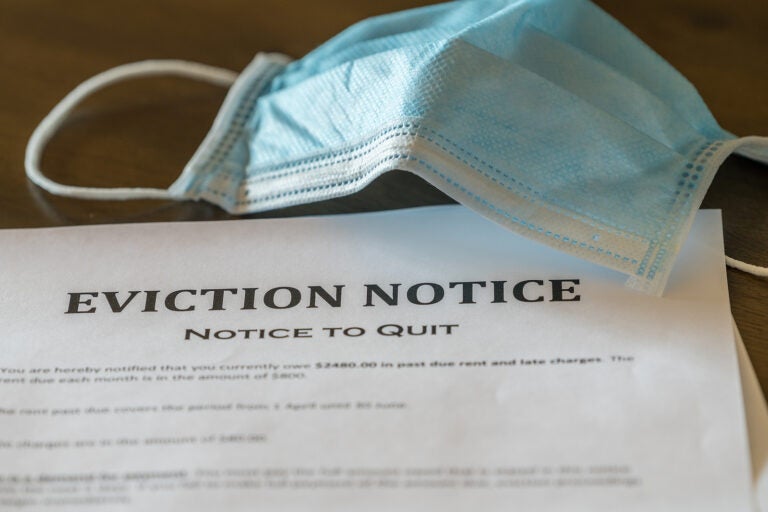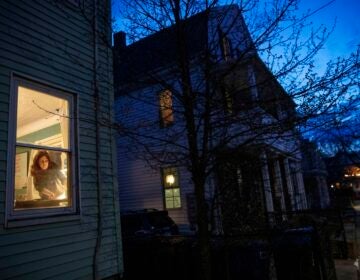Eviction is bad for our health. Pa. must act to protect families.
When families are evicted, children suffer the consequences. As a pediatrician, I urge Pa. to protect families at a perilous time.

Defaulting renter with face mask receives letter giving notice of eviction from home on wooden table. (BackyardProductions/BigStock)
As a pediatrician, I spend most of my day reassuring families that their child is doing well, ensuring that their growth and development are where they should be, and treating children who are sick or injured. The parents of the children I treat are sometimes nervous and scared. And who wouldn’t be? If a parent brings their child in to see me, it’s because they only want what’s best for their child.
But, right now, the parents of the children I see have a different reason to be scared — one that could have tragic consequences for their families.
COVID-19 has caused more than just health problems for people across the country: It has stripped bare the racial inequities that have plagued communities and caused economic devastation for members of our community, as so many, including many parents, have lost their jobs due to the shutdown and the health risks that come with working right now.
Acknowledging that job loss and backlogs in the unemployment compensation system are causing people to struggle to pay their rent or mortgages, Governor Tom Wolf issued an executive order in March, and later extended it, to place a moratorium on evictions and foreclosures. This was a vital step, ensuring that families who are struggling to get by would have time to get back on their feet, get back to work, or access assistance programs, to prevent homelessness during the pandemic.
Unfortunately, the moratorium expired on August 31, without any extension due to legal limits, despite the fact that the unemployment rate is still at historic highs, and people who lost their jobs or their hours have no way to make ends meet. While I was also heartened to learn that the CDC issued a moratorium on evictions until December 31 and which goes into effect on September 4, the CDC moratorium only covers non-payment of rent cases. It does not require the landlord to provide notice of the moratorium and depends on the tenant to complete a declaration.
Families are now being served with eviction notices, and many will soon lose their homes, being forced to double-up with family or enter the already overwhelmed shelter system. And with COVID-19 still ravaging our communities, there’s a risk of a potential second wave, which could shut down our economy once again.
When families are evicted, children suffer the consequences.

Subscribe to PlanPhilly
Eviction exacerbates health problems, from asthma and allergies to behavioral health issues. Homelessness can cause exacerbations in a child’s learning slides and potentially risk involvement in the child welfare system.
To make matters worse, most children, especially those from lower-income communities, are starting school virtually, at home. But how can they learn at home, if their parents are being served with eviction notice?
It shouldn’t be this way. It’s immoral and short-sighted. Governor Wolf should have been able to extend the eviction and foreclosure moratorium, yet families who are struggling are starting to be served with court papers. The Governor and the Pennsylvania Legislature can still step in and put a stronger moratorium on evictions and foreclosures than the CDC Order, before thousands of Philadelphians lose their homes.
A new state moratorium will buy time for people to get back on their feet, so they can pay their rent and landlords can recoup the rental income they need. Not only do evictions cause dire health consequences, but they are costly for everyone involved — including landlords. If people who lose their jobs are given time to obtain new employment or access rental assistance programs, landlords will actually benefit more so than if people are evicted.
The state has set up rental assistance programs, but so far the programs are hard to access and the money has been very slow to be paid out, as applications are piling up. A moratorium on evictions and foreclosures would give time for assistance programs to be truly up and running, so they can serve their purpose. Furthermore, members of the Pennsylvania Legislature are considering improvements to the rental assistance program, so that more tenants will have access to the help they need. But this will take time. The legislature must extend the eviction moratorium to give themselves time to solve this crisis.
As children and families face the threat of losing their homes, at a time when they need homes for schooling and shelter for safety, as a doctor, I am terrified. I am terrified for the children I treat, who will suffer the consequences if our elected officials fail to act to solve this crisis, and for the parents who are trying their best to do what is right for their kids in these unprecedented times.
Reinstating the state eviction and foreclosure moratorium is actually a simple fix, and it could be life-saving for the people who need it.
The Governor and the Pennsylvania Legislature must take action now to make sure people don’t fall through the cracks of the CDC order, to prevent economic devastation and dire health consequences that could harm our children for years to come.
Dr. Daniel R. Taylor is an associate professor at Drexel University College of Medicine and director of community pediatrics and child advocacy at St. Christopher’s Hospital for Children.
WHYY is your source for fact-based, in-depth journalism and information. As a nonprofit organization, we rely on financial support from readers like you. Please give today.





![CoronavirusPandemic_1024x512[1]](https://whyy.org/wp-content/uploads/2020/03/CoronavirusPandemic_1024x5121-300x150.jpg)


